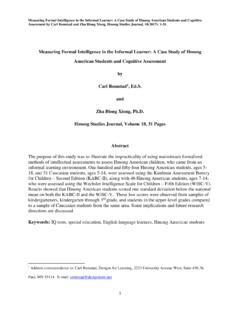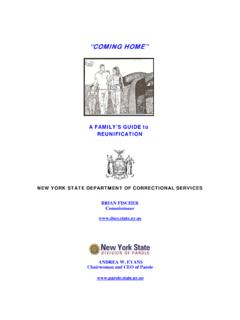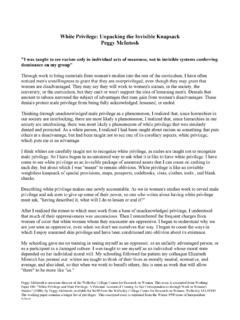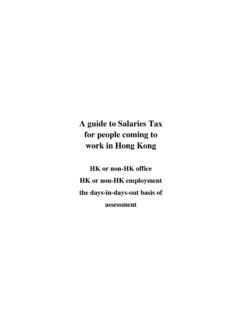Transcription of Complicating Discourses of “Coming Out”
1 The Importance of Family for a Gay Hmong American Man: Complicating Discourses of coming Out by Bic Ngo, Hmong Studies Journal, (2012): 1-27. The Importance of Family for a Gay Hmong American Man: Complicating Discourses of coming Out . By Bic Ngo, University of Minnesota Hmong Studies Journal Volume 13(1), 27 Pages Abstract This article draws on research with a gay Hmong young man to illustrate the ways in which coming out Discourses fail to take into account the central importance of family and kinship for gay Hmong Americans. It draws on the narratives of a gay Hmong man that emphasizes the importance of family reputation and family bonds to offer an alternative discourse to coming out narratives. It advances understandings of gay identity and experiences by explicating the ways in which family and community are important for a gay Hmong American man. This research significantly contributes to the dearth of research on Asian American LGBT experiences in general and those of LGBT Hmong Americans in particular.
2 Keywords: Hmong, gay, coming out, family The Importance of Family for a Gay Hmong American Man: Complicating Discourses of coming Out by Bic Ngo, Hmong Studies Journal, 13(2012): 1-26. The Importance of Family for a Gay Hmong American Man: Complicating Discourses of coming Out . In the early morning of June 28, 1969 police raided Stonewall Inn and arrested patrons at the Greenwich Village bar who were dancing with same-sex partners (Carter, 2010; Duberman, 1994). Although raids on gay bars were routine at the time, this particular one sparked a spontaneous rebellion by the lesbian, gay, bisexual and transgender (LGBT) patrons. As word spread about the raid and riot, the bar patrons were joined by a large crowd from the local LGBT. community. Spanning across six days, the demonstrations protested discrimination against the gay community and launched the gay rights movement (Carter, 2010). Since these riots, dominant Discourses of the gay civil rights movement construct coming out as central to gay identity and liberation (Clendinen, 1999; Duberman, 1994; Humphreys, 1972; Seidman et al.)
3 , 1999). The rallying cry of this pride-based identity politics was Out of the closet, into the streets! (Humphreys, 1972, p. xii). Today, the emphasis on coming out within gay rights Discourses is epitomized by annual events such as National coming Out Day and pride marches that occur in cities throughout the world (Alsenas, 2006; Clendinen, 1999). For Asian American communities, annual events such as Pride and Heritage celebrate LGBT community members during Asian Pacific American Heritage Month each May (Bugg & O'Bryan, 2006). The rights and visibility of LGBT Asian Americans are increasingly supported by organizations such as the National Queer Asian Pacific Islander Alliance (NQAPIA). Despite the importance of coming out Discourses for the gay rights movement, dominant gay rights Discourses cannot adequately explain the complexity of the experiences of LGBT. Asian Americans. In particular, this article draws on research with a gay Hmong young man to 2.
4 The Importance of Family for a Gay Hmong American Man: Complicating Discourses of coming Out by Bic Ngo, Hmong Studies Journal, 13(2012): 1-26. illustrate the ways in which coming out Discourses fail to take into account the central importance of family and kinship for gay Hmong Americans. It advances understandings of gay identity and experiences by explicating the ways in which family and community are important for a gay Hmong American man. This research significantly contributes to the dearth of research on Asian American LGBT experiences in general and those of LGBT Hmong Americans in particular. Background Researchers of Asian and Asian American sexuality suggest that Discourses of coming out and being out and proud encourage and propagate Western individualism and aggressiveness. Chou (2000) asserts that the coming out Discourses of the gay rights movement are imbued with Western values and experiences that cannot be imposed on other cultural traditions.
5 In a similar vein, Wang and colleagues (2009) state that the construction of coming out as a normal stage of gay identity development disregards the diversity of gay men that is reflective of diverse cultures and traditions. They particularly point out the ways in which a discourse of coming out reflects Western individualistic conceptions of selfhood but fails to recognize the importance of relational selfhood, which is important in Chinese culture (p. 287). Other scholars point out that for Asian American immigrants, homosexuality is a Western behavior (Matteson, 1997; Varney, 2001) that even lacks explanatory vocabulary and traditions within some Asian groups (Author, 2011; Boulden, 2009; Varney, 2001). Consequently, coming out to family may be exceptionally difficult, infused with the dangers of family rejection. As Augilar-San Juan (1998) cogently put it: queer Asian Americans come out and go home only at the risk of great loss, sometimes terror, even death.
6 Gestures toward home 3. The Importance of Family for a Gay Hmong American Man: Complicating Discourses of coming Out by Bic Ngo, Hmong Studies Journal, 13(2012): 1-26. and family seem both necessary and impossible: necessary for a sense of completion, impossible because family requires heternormativity (p. 38). More specifically, Varney (2001) suggests that the dominant narrative of coming out that exists in mainstream LGBT communities is a Western norm that is defined as a process where you have to automatically be proud, and be out to everyone (p. 94). Problematically, coming out does not reflect the familial commitments and experiences of Asian and Asian American youth. In much the same way, Manalansan (2003) finds that for many Filipino gay men, coming out is viewed as a particularly American idea and behavior (p. 27) that is less meaningful in their everyday lives. Likewise, Tan (2001) shows that coming out is not a significant factor in the daily lives of Singaporean gay men as it is within White American gay rights Discourses (p.)
7 866). By and large, researchers of Asian and Asian American LGBT experiences find that the focus of coming out Discourses on individual identity and development fails to take into account the central importance of family social relations and expectations. For LGBT Asian and Asian Americans, duty to parents and family networks cannot be adequately addressed by Discourses of coming out (Akerlund & Cheung 2000; Kimmel & Yi, 2004; Operario, 2008). For example, significant obligations of filial piety require children to marry and have children (Boulden, 2009;. Operario, 2008; Shan, 2004; Wang et al., 2009; Yang, 2008; Zhou, 2006). Failure to fulfill these family obligations has serious consequences not only for the individual, but also for the whole family. As Aoki, Ngin, Mo, and Ja (1989) explain: A person is not viewed as an individual but as a representative of his or her family. Maintaining face,' the public persona, dignity, or self-esteem, is all-important.
8 Loss of face has serious repercussions because it reflects negatively on the individual's entire 4. The Importance of Family for a Gay Hmong American Man: Complicating Discourses of coming Out by Bic Ngo, Hmong Studies Journal, 13(2012): 1-26. family and community and not just on the individual. One maintains face by fulfilling culturally appropriate responsibilities and acting in accordance with norms with respect to one's social role (p. 295). From this perspective, each member of a family is not considered an individual who stands alone, but is a representative of the entire family. The actions and behaviors of the individual have consequences for the reputation or face of his or her family. Yang's (2008) research with LGBT Hmong Americans finds that participants felt that coming out or being honest about their sexual orientation amounted to disobeying parents and disregarding the family responsibilities they had as good children.
9 She suggests that family reputation is critically important in this way: while parents seemed to be reacting out of their own homophobia, there was also the realistic fear that the entire family could be rejected, creating a rippling effect within family structures and the community (p. 101). Consequently, she finds that the parents of LGBT Hmong Americans hide or closet the sexual orientation of their children in order to protect the family reputation. In a similar vein, Boulden's (2009). Hmong American participants believed that they were going to have to give up being Hmong, or fearing that they would be rejected by the Hmong community if it was discovered that they were gay (p. 18). In order to protect the reputation of the family, Asian and Asian American LGBT tend to hide their same-sex attraction (Han, 2001) or make compromises for the sake of the family (Boulden, 2009; Shan, 2004; Zhou, 2006). Boulden (2009) reveals the pressures faced by gay Hmong American men to marry, have children, and protect the reputation of family and clan.
10 Shan (2004) shows that a Taiwanese gay man fulfilled his family obligation by marrying a Vietnamese woman. Zhou (2006) notes that Chinese gay men marry but then divorce after their 5. The Importance of Family for a Gay Hmong American Man: Complicating Discourses of coming Out by Bic Ngo, Hmong Studies Journal, 13(2012): 1-26. first child as a way to navigate between family duties and individual desires. Wang and colleagues (2009) suggest that in Taiwan, [i]n order to fulfill the obligation of filial piety, some parents insist that their gay son gets married (p. 293). Other studies observe that many Asian and Asian American LGBT individuals are heterosexually married with children (Kimmel & Yi, 2004; Chou, 2000). Further, because coming out may threaten family relationships (Chou, 2000; Tan, 2001;. Varney, 2001; Yang, 2008), LGBT Asian ethnics negotiate sexual identity disclosures in different ways. Ground-breaking research by Chou (2000) finds that going home with partners may be more salient.










